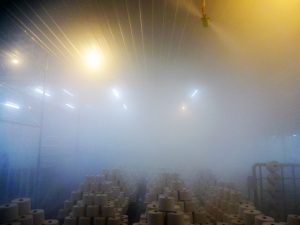Textile
Textile yarn storage process
Process
Textile yarn storage process requires a thorough knowledge of materials and care. Every material requires a certain type of care as they react differently to storage challenges such as:
- Moisture
- Heat
- Fungus
- Mildew
What are the optimal textile yarn storage process conditions?
Moreover, in the yarn or textile storage process, it is being suggested to preserve the materials in the following conditions:
- A room temperature between 20 -22 C: a lower temperature might lead to a dry environment. This will affect the material, making it dry and easy to break. On the other hand, a high temperature and high humidity accelerate the deterioration of the materials. This will make the material loose and expanded, and lead to the occurrence of mold.
- An enclosed room with no access to direct sunlight: the light can influence the change of the textile color, which can yellow or darken due to oxidation.
- Air conditioning or humidification system that assists in maintaining the relative humidity level between 50-70%, depending on the type of stored textile materials.
Thus, as a general recommendation it is critical that the storage room, space, or area where the yarn is deposited, is in a dark and cool, with an optimal temperature and humidity that benefits to the overall well-being of the textile materials.
Furthermore, the fabrics characteristics of cotton fabrics and yarn, require a pre-treatment. This is imperative as they are prone to absorbing water from moisture.
Solutions
How the implementation of the AKIMist “E” Dry Fog Humidifier benefits the yarn storage?
As the drops of the AKIMist provide a very fine fog, called Dry Fog, it does not wet its surroundings and neither the yarn. However, the AKIMist assists in regulating the suitable level of relative humidity and temperature in the storage. By doing so:
- the yarn or textile string becomes stronger and more flexible,
- maintaining and preserving the structure, and
- the color of the material.
This also assists in providing the yarn with the optimal level of moist, which will impact its weight. The weight and quality are critical financial factors for textile companies, as it is directly impacting the price of the yarn cone. Moreover, the AKIMist’s Dry Fog prevents static electricity from occurring, as the possible discharges create sparks, which are the triggers for possible fires and hazards.

